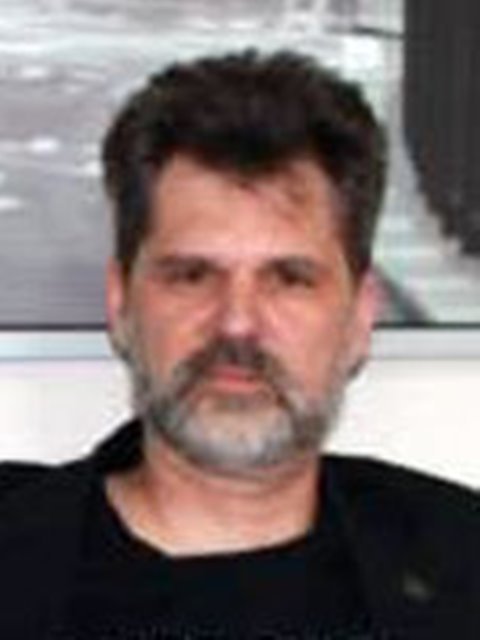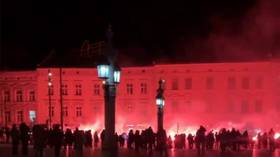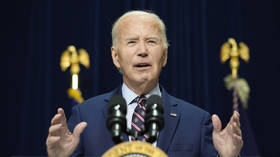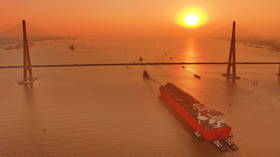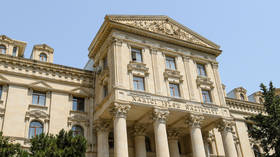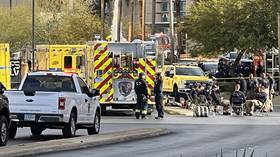The Islamic State and Kurdish Nationalism
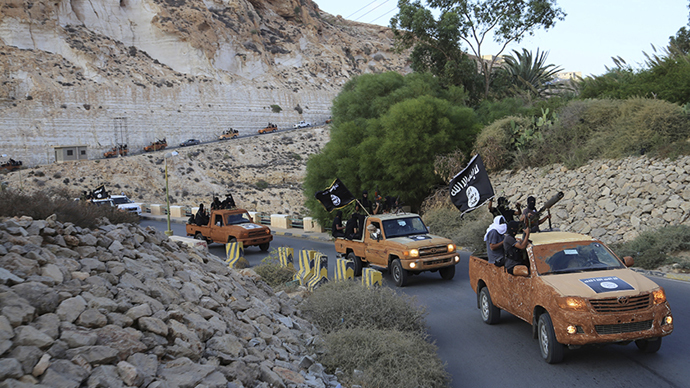
Despite massive support from the US-led coalition, the Syrian border town of Kobani is still besieged by ISIS jihadists while the Turkish Army remains steadfastly standing still just across the Syrian border.
Public opinion in Turkey is very much divided over what course the government should take to tackle the ongoing crisis. Turkey's large Kurdish minority has taken to the streets protesting the army's inaction in the face of the onslaught, while the country's civil authorities have taken in numerous Kurdish refugees crossing the border into relative safety and uncertainty (to date, approximately 200,000 Kurds have taken this plunge).
At the same time, the Turkish Disaster and Emergency Management Presidency (known by the Turkish acronym AFAD) sent 1,000 bottles of water and 5,000 cartons of milk to the besieged town last Friday. In fact, already three days after the commencement of the siege, Turkey sent 46 vehicles with humanitarian aid to Kobani and its surrounding area (19 September).
The total aid delivered to the war-torn country - medicine, food, tents, clothing and cleaning supplies - has cost Turkey up to 700 million Turkish Lira (about $308 million) over the years.
Still, Turkey seems unwilling to enter the fighting on the ground directly. Foreign Minister Mevlut Cavusoglu, speaking at a joint press conference with NATO chief Jens Stoltenberg earlier in October, said that "terrorism should be dealt [with] in a comprehensive manner.” And so, Turkey continues to tread lightly as the internal repercussions of the IS assault on Kobani continue to reverberate.
Kurds clash in Turkey
Turkish Kurds have been violently protesting the siege of Kobani which led to clashes with the police and the deaths of 37 people over four days. Turkey's light tread over the Kobani issue is all about the terrorist PKK (Kurdistan Workers' Party) and the Kurdish peace process initiated by the ruling Justice and Development Party (or AKP) at the end of 2012. In other words, rather than any concerns over either Assad or the safety of the Syrian population, Turkey's political leadership is now apparently more worried about domestic issues and matters relating to the continued future peaceful cohabitation of Turks and Kurds under the banner of the Sunni AKP. The current Kobani-inspired Kurdish demonstrations in Turkey have also led to violent confrontations between rival “civil groups”, in Istanbul, but also in Diyarbakır, Batman, Siirt, Bingol, Mardin, and Van. It seems that supporters of the PKK, sympathetic to the Kurdish plight in Kobani, have attacked members of the Huda-Par political party, that performed surprisingly well during the previous municipal elections. The latter is a Kurdish-based Sunni Islamic fundamentalist political party, its name disclosing its nature and possible affiliation: The acronym Huda-Par stands for Hur Dava Partisi or Free Cause Party, but at the same time, the noun Huda refers to God or Allah, and thus, the acronymized version of the Free Cause Party could be taken to mean the Party of Allah. And in this context, the name Hizbullah meaning the Party of Allah pops up quite naturally.
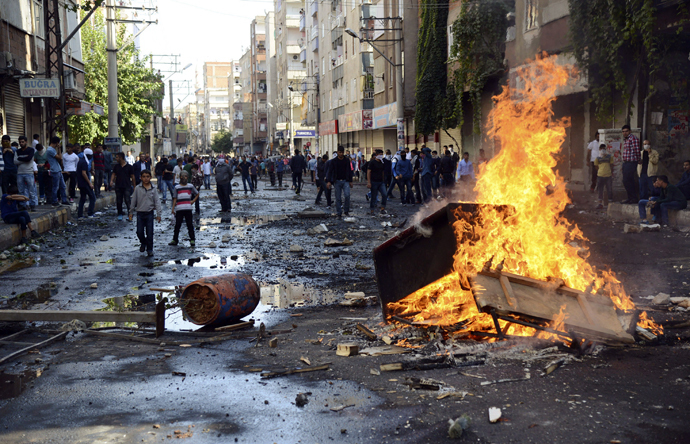
In Turkey, an organization called Hizbullah (not to be confused with the Lebanese Hezbollah) "was founded in the 1978 in Batman province by Huseyin Velioglu and its ultimate aim was to establish an Islamic state based on Shari'a law,” as reported by Mehmed Sabri Akgonul in The Kurdish Globe, an Erbil-based English-language weekly. Akgonul 's piece continues as follows: in "those years, [Hizbullah] has created strong bases in urban centers of north Kurdistan [or South-Eastern Turkey] when the Kurdistan Workers' Party (PKK) carried out guerilla activities in rural areas. In the early 1990s Hizbullah took up arms and clashed with the PKK. In June 1992, the PKK killed ten Hizbullah members in the village of Yolac in Diyarbakır. Hence, a bloody fight started between two groups in many places such as Batman, Gercus, Mardin, Van, and Silvan. At this stage, [Hizbullah] avoided clashing with Turkish security forces and Turkish police turned a blind eye to [Hizbullah]'s illegal activities. Thus, some analysts and [the] majority of Kurdish people firmly believe that [Hizbullah] was created and supported by the Turkish state in order to assist Turkish security force's intensive war with the PKK. Major confrontation between [Hizbullah] and the PKK resulted in the killing of at least 800 people. [Hizbullah] clashed not only [with the] secularist (this means anti-religious or atheist in the [Hizbullah]'s mindset) PKK but it had also targeted traditional Sufi Kurdish networks, a group of Kurdish businessmen and rival Islamist organizations in [South-Eastern Turkey] like Med-Zehra and Menzil religious communities.”
And now, it seems, the imminent fall of the Kurdish town of Kobani has once again revived these intra-Kurdish differences in Turkey. Still, following the initial unrest in Turkey over the past days the situation seems to have calmed down, leading some pro-government figures to assert that the PKK- Huda-Par confrontation was part of a bigger yet failed conspiracy to derail the AKP-inspired Kurdish peace process and undermine the internal harmony of the Republic of Turkey. Government figures and sympathizers have used similar arguments in connection with the Gezi protests and the 17th December corruption scandal engulfing the AKP, popularly known as #AKPgate.
Meanwhile in Kobani
The Syrian PYD (or the Kurdish Democratic Union Party), as the political entity governing the Kurdish enclave of Rojava across the border, and is tightly linked to the Turkish PKK, and actually seen as one and the same organization by many in Turkey. For example, the leader of the Nationalist Movement Party (or MHP) recently declared that the real goal behind the protests and the IS siege of Kobani was to "destroy the peace and unity of Turkey.” The MHP was not just coincidentally the one opposition party to have backed the AKP-initiated parliamentary measure to authorize military intervention across the Turkish borders into Iraq and Syria (October 2).
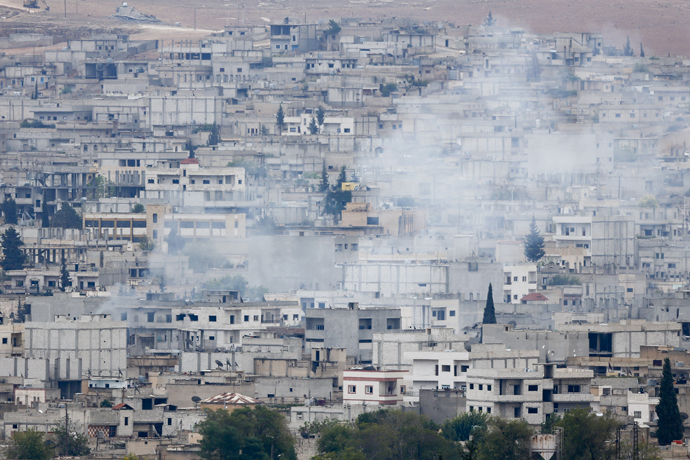
The HDP (or Peoples' Democratic Party), as the political arm of the PKK, has also been making some ominous sounds of late. The party's central executive council released a written statement recently that declared that "the peace process and Kobani cannot be separated from one another, as the road to peace passes through Kobani, so that, if one falls the other will fall as well and that [subsequently] a great psychological rupture will be experienced.” The statement followed consultations with now-imprisoned PKK leader Abdullah Ocalan (confined to the island of İmralı since February 1999) - a fact underlying the strong nexus between the PKK, PYD and HDP. “We are once again calling upon the [AKP-led] government, you are jeopardizing the peace [or resolution] process by means of not supporting Kobani, [and by means of] hindering those who wish to support Kobani,” the statement read. In addition the HDP calls upon the government to open a "humanitarian corridor" to Kobani, in order to meet "all the demands" of the resistance fighters of the city, effectively inviting the AKP to aid and support the PYD (or PKK) in its fight against the IS.
Even though the AKP's long-term goals would seem to include Turkey's Kurds, the likelihood of the present government openly cooperating with an organization overtly linked to the PKK is not just remote but really non-existent. As a result of American meddling in the region, Kurds living beyond Turkey's borders have achieved remarkable progress over the past decade. Particularly, the Kurds living in Northern Iraq who have been enjoying a measure of autonomy and self-determination quite unthinkable for other Kurdish minorities are a case in point. Iraq's north has become officially known as the KRG or the Kurdistan Regional Government, and its underground hydrocarbon wealth has secured its prosperity and progress, albeit at the expense of cordial relations with the central government in Baghdad. These Kurdish underground treasures are also the ostensible reason for the good relations between Erbil and Ankara of late. Cordial ties with a definite impact on the AKP-initiated Kurdish peace process in Turkey. The sudden appearance of the Islamic State on the Syrian-Iraqi scene has thrown the AKP's steady progress off-course.
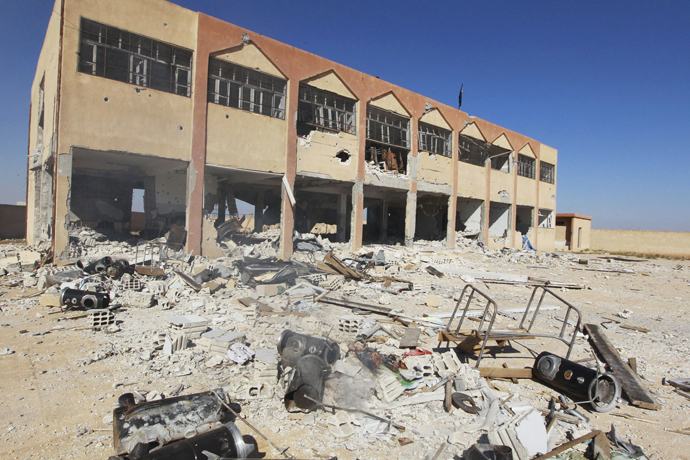
During the summer, the KRG's President Massoud Barzani publicly declared that the matter of (Iraqi) Kurdish independence is to be decided by a popular referendum, to be held either later this or early next year. The appearance of an independent Kurdish state on its borders would be highly unpalatable for Turkey and its political class (either Islamist, nominally secularist or openly nationalist). In this context, Dr Farsat Sofi, an MP belonging to Barzani's Kurdish Democratic Party (or PDK, according to its Kurdish acronym), made a salient and possible somewhat threatening declaration: a "greater Kurdistan is the dream of every Kurd. But for now we want to set up a state in this country [i.e. Iraq].” In other words, an independent Kurdistan in Northern Iraq could very well be the opening move for redrawing the mapped heritage of Sykes-Picot by means of consolidating Kurdish unity - stretching from Syria in the West (Rojava), over Turkey in the North (South-Eastern Anatolia) and Iraq in the South (KRG) to Iran in the East (Rojhilate Kurdistane).
IS threaten Baghdad and Kurds unite
As the Turkish Army continues playing a waiting game on the Syrian border, the US has been active behind the scenes in an effort to revive relations and secure a more active response. Last Friday, the State Department declared that "Turkey has agreed to support, train, and equip efforts by the moderate Syrian opposition,” as expressed by spokeswoman Marie Harf. She told the media that "there will be a [US Defense Department] planning team traveling to Ankara next week to continue planning that through military channels.”
On October 12, the Pentagon indicated that Turkish authorities have agreed to allow US warplanes to use its air bases for bombing missions in Syria. On the same day, US Defense Secretary Chuck Hagel spoke with Turkish Defense Minister İsmet Yılmaz, leading Pentagon spokesman Rear Adm. John Kirby to declare that "both leaders have stressed the need to continue taking a comprehensive strategic approach to the threat posed by ISIL and other extremist groups.” In this vein, the Turkish Army proceeded to bomb PKK positions in the vicinity of Daglıca by means of deploying F-16 and F-4 fighter jets from bases in Malatya and Diyarbakır. This was the first substantial operation aimed at the PKK by the army since the start of the peace process in 2012. The air strikes came in response to a 3-day PKK attack on the local military headquarters. The US-led allied forces, on the other hand, have now apparently turned their attention to defending the Iraqi capital of Baghdad, as the Islamic State appears to have used the world's preoccupation with the siege of Kobani to slowly but surely encroach upon the erstwhile seat of the Abbasid Caliphate (762-1258).
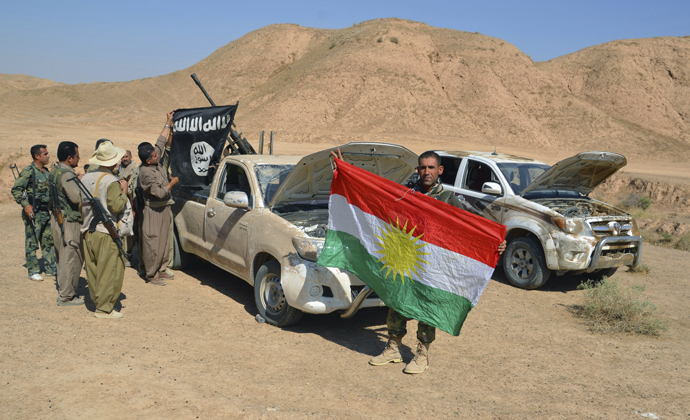
Against this backdrop, the KRG Prime Minister Nechirvan Barzani said "we are not unaware of ISIS's attacks on the Kobani region of Rojava. We have supported Kobani in terms of weapons and ammunition. Due to geographic restrictions, we are unable to send in the Peshmerga forces to Kobani. The Airstrikes conducted by the coalition forces [are] being jointly coordinated by the coalition and the Kurdistan administration. The President of the Kurdistan Regional Government Masoud Barzani is personally following the situation in Kobani and is constantly trying to [intervene].” And so it seems, Kurds are uniting across national boundaries and quite naturally, the KRG is taking the lead in this respect, providing leadership and support to Kurds in danger.
The KRG and its Peshmerga, on the other hand, are in turn being supported by NATO member Germany. In late September, the German Army started training 32 Peshmerga officers in the use of various types of anti-tank weapon systems, knowledge they are then supposed to pass on to their troops in the KRG. At the same time, the German Defense Ministry has sent weapons to Northern Iraq as well. In an effort to exercise some form of oversight, the German leftist politician and war-opponent Jan van Aken followed these German weapons to their destination. In the KRG, he was told that Germany had sent the Kurds all but antiquated and outdated weapons that would be of little to no use. Jan van Aken spoke to Christoph Herwartz, the political editor of the German news provider n-TV, a subsidiary of RTL Deutschland. But the really interesting aspect of Van Aken's testimony lies in the fact that he matter-of-factly asserts in his conversation with Herwartz that he met with Peshmerga as well as PKK officers to discuss the arrival of German firepower.
As a result, in the wake of the IS assault on the city of Ayn al-Arab (aka Kobani) Kurdish alliances and inter-connections have been brought out in the open and can only lead to the question whether the emergence of the IS will eventually lead to the creation of a new independent Kurdish state or Kurdistan? And, whether the jihadi philosophy espoused by the Caliph and his followers will thus ultimately do nothing but serve the cause of Kurdish nationalism? Is the present crisis in the Middle East really nothing but the result of the application of the principle of "creative chaos," as advocated by Condoleezza Rice?
The statements, views and opinions expressed in this column are solely those of the author and do not necessarily represent those of RT.
The statements, views and opinions expressed in this column are solely those of the author and do not necessarily represent those of RT.
